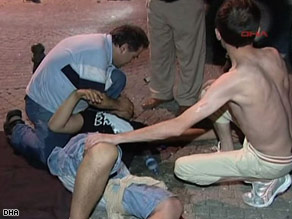

LOS ANGELES (AP) — Firefighters on Sunday took advantage of cooler, damper weather to battle a vast blaze ravaging Santa Barbara County as they tried to gain a foothold against the fire before the expected return of hotter, drier conditions.
Moist air currents from the ocean cooled temperatures to the high 70s Sunday, helping fire crews keep the four-day-old blaze from spreading. The fire, which has been burning since Tuesday, was less than a third contained Sunday afternoon.
"We've got a window here with the humid weather that's really helping us. But we know we're in this for the long haul," said Dixie Dies, spokeswoman for the state Incident Management Team.
Temperatures are forecast to start climbing Monday and to reach the 90s by Thursday. The moist air currents are expected to dissipate, causing drier conditions, Dies said.
Lightning strikes were also possible as a new weather system moves in, forecasters said.
The fire, 28% contained Sunday night, has consumed about 13 square miles of Los Padres National Forest.
Nearly 2,700 homes were in jeopardy earlier in the weekend, but by Sunday night many of the evacuation orders were lifted or downgraded to warnings.
"People are filtering back to their neighborhoods and they're very happy," said forest spokesman John Ahlman. Some mandatory evacuations remained in scattered mountain communities south of Highway 154 and in areas on the west end of the fire, Ahlman said. He did not have exact numbers of how many homes were affected.
Firefighting crews made progress Sunday in controlling the fire's perimeters, said Santa Barbara County spokesperson Carrie Topliffe.
"It's pretty well stopped on the southern flank, where most of the structure threat was," Topliffe said.
The fire is blazing through 15 to 20-foot tall forest in extremely steep, rocky terrain. Crews are relying mainly on drops of flame retardant by helicopters and DC-10s to control the burning ridges and canyons, Dies said.
Officials decided Sunday that the nearly 1,200 firefighters, from 22 states and the District of Columbia, are sufficient to combat the fire, Dies said. "They're working incredibly hard," she said.
The fire still had the potential to roll through a hilly area of ranches, housing tracts and orchards between the town of Goleta and Santa Barbara.
Investigators suspect the fire was human-caused. The U.S. Forest Service has asked for public help in determining how it was set.
Sunday's cooler weather also helped firefighters advance on a two-week-old blaze that has destroyed 22 homes in Big Sur, at the northern end of the Los Padres forest.
"The fog held on a little bit stronger than was originally anticipated, which was great for the crews out working on the lines," said Sarah Gibson, a spokeswoman for the command post in charge of fighting the blaze.
The improved weather did have some drawbacks. Fog made the takeoff of firefighting aircraft more difficult and hampered efforts to start controlled burns to clear out brush ahead of the advancing wildfire, Gibson said.
The fire, which has charred 113 square miles, was 11% contained, a slight jump from the day before. Fire officials said crews were burning out brush between the fire's edge and Big Sur's famed restaurants and hotels and cutting more lines to halt flames creeping down from ridge tops.
"The biggest challenge is whether or not the containment lines that they're building now and continuing to improve are going to hold as the fire approaches," said Rolf Larsen, a spokesman for the U.S. Forest Service.
Wildfires have burned more than 800 square miles of land and destroyed at least 69 homes throughout California, mainly in the northern part of the state, in the past two weeks. One firefighter died of a heart attack while digging fire lines.
About 1,400 fires have been contained, but more than 330 still burned out of control Sunday morning.
Gov. Arnold Schwarzenegger, who on Saturday visited a command post in the coastal region of Santa Barbara County, has ordered 400 National Guard troops to be trained in wildfire fighting so they could help fight the state's blazes.
He also urged lawmakers to adopt his budget plan for a $70 million emergency surcharge on home and business insurance policies to buy more firefighting equipment.
California now has a year-round fire season and needs the money from the fee, which should cost the average homeowner about $1 a month, Schwarzenegger has said.
VIEW SOURCE






